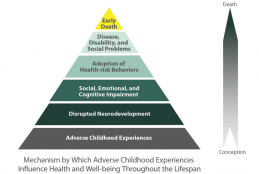
The Philadelphia ACE Research Committee is comprised members in pediatrics, behavioral health, and adolescent medicine, and epidemiology, who developed the Philadelphia Expanded ACE Survey Questions.
Click here to return to Workgroups main page
Philadelphia ACE Research Committee Members
Megan H. Bair-Merritt, MD
Peter Cronholm, MD, MSCE, FAAFP
Joel Fein, MD, MPH - Co-Chair
Christine Forke, PhD, MSN, CRNP, Co-Chair
Mary Harkins-Schwarz, MPH
Lee M. Pachter, DO
Roy Wade Jr., MD, PhD, MPH, MSHP
Staff: Carolyn Smith-Brown
Our Work
- Publication, promotion, and dissemination of existing survey results and use of the Expanded ACE questions
- Follow-up and longitudinal next steps
- Review and permission for use of the Philadelphia Expanded ACE Survey Data
What is the Philadelphia Expanded ACE Study?
During the initial convenings of the Philadelphia ACE Project, members wondered if living in an urban area might bring particular stresses not covered in the original ACE study, which focused primarily on household adversities. In 2012 and 2013, members came together to develop the Philadelphia Expanded ACE Study to better understand the impact of community-level adversities. In conjunction with the Public Health Management Corporation’s Household Health Survey, researchers surveyed 1,784 adult participants in Philadelphia about the original ACEs and five additional community-level stressors that are more specific to living in an urban environment.
Philadelphia's demographic makeup looks significantly different than the original study, in which the majority of participants were white, college-educated, and middle-income. In Philadelphia, where roughly a quarter of residents live in poverty, researchers found that almost seven in ten adults had experienced one ACE and one in five had experienced four or more.
The community-level indicators included witnessing violence, living in foster care, bullying, experiencing racism or discrimination, and feeling unsafe in your neighborhood. Researchers found that almost 40 percent of Philadelphians had experienced four or more of these expanded, community-level ACEs.
To view the report on the Findings of the Philadelphia ACE Survey, click here.
To request a copy of the Philadelphia Expanded ACE Survey questions, click here.
To request access to the Philadelphia ACE Data, click here.
